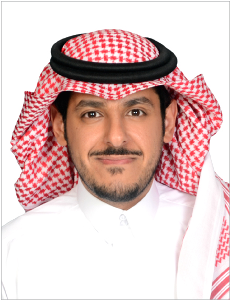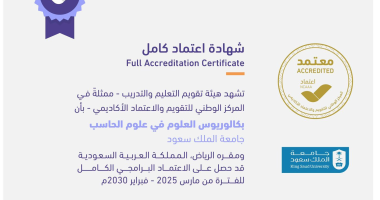Pharmaceuties Department
-
About
Pharmaceutical Chemistry DepartmentThe Pharmaceutical Chemistry Department at King Saud University is a key department within the College of Pharmacy. Established in 1959 (1379 AH) alongside the college, the department has been instrumental in training pharmacists capable of discovering and developing new medications to treat various diseases. It also assesses the safety of pharmaceutical products, ensuring they are free from impurities that could cause illness or side effects in consumers.
The department relies on three main pillars to achieve these goals:
- Scientific Research: The department strives to conduct advanced scientific research in both pharmaceutical and analytical chemistry.
- Education: The department provides outstanding education to its undergraduate and postgraduate students, preparing them for careers in research or the pharmaceutical industry. The department contributes to the PharmD program by teaching several courses and also offers postgraduate programs leading to Master's degrees in Pharmaceutical Sciences and PhDs in Pharmaceutical Chemistry. In addition, the Pharmaceutical Chemistry Department, in collaboration with the Pharmaceutics Department, offers a joint Master's program in Quality Control of Pharmaceutical Preparations. The department also contributes to teaching several courses in the Executive Master's program in Pharmaceutical Legislation.
- Community Service: The department seeks to provide scientific services to the community, including health awareness campaigns, pharmaceutical consultations, and diverse services and consultations for various sectors related to medicine.
- The Pharmacognosy Department is one of the most important departments in the College of Pharmacy. It was established in 1959 (1379 AH)
 , two years after the founding of King Saud University.
, two years after the founding of King Saud University. - Pharmacognosy is the study of drugs derived from natural sources such as plants, animals, microorganisms, marine life, and certain minerals.
- The department teaches courses covering the methods of collecting, storing, separating, and preparing drug components from plant or animal sources for use in formulating pharmaceutical preparations. The department's curriculum covers various areas including drug preparation for medicinal use, quality assessment methods, and the bioactivity of certain drugs. The studies extend to include various bioactive compounds and natural products such as antibiotics, anticancer drugs, enzymes (yeasts), vaccines, serums, vitamins, hormones, and methods of identifying drugs, toxins, and stimulants.
- Students also learn about the active components and methods used in the chemical and biological screening of medicinal plants, the influence of the environment on these components and methods. To enhance the integrated nature of the college's curriculum, the department contributes through its core courses to the Doctor of Pharmacy (PharmD) program, as well as elective courses on nutritional supplements, herbal medicine, and other globally used methods in various alternative medicine approaches. It also covers methods for evaluating herbal preparations according to internationally recognized standards and evidence-based herbal medicine.
- At the postgraduate level, the department offers a Master's program in Pharmacognosy with twelve advanced specialized courses and advanced research programs. It also offers a PhD program in Pharmacognosy with eight specialized courses focusing on specific research aspects of pharmacognosy. These programs aim to provide the nation with distinguished pharmaceutical professionals specializing in pharmacognosy who contribute to the application of scientific and research methods in studying and utilizing medicinal plants and natural products available in the local environment, thus contributing to the knowledge economy.
Department Head Message

Pharmacognosy department aims to achieve the Kingdom's 2030 vision of improving health by supplying the country with distinguished national pharmaceutical cadres, who contribute to the application of the scientific and research method based on evidence in the study and exploitation of medicines derived from natural sources and contribute to the knowledge economy, and it also aims to produce qualified pharmacists through Providing high-quality education , and providing an advanced research environment that leads Saudi scientists to benefit from medicinal plants, and the natural products available in the local environment, where pharmacology is concerned with the study of drugs derived from natural sources (plants - animals - microorganisms - marine biology - and some inanimate objects). The department's curricula also include methods of collecting the drug from nature, storing it and separating its components Then preparing them for use in the form of pharmaceutical preparations, and for this purpose the department teaches various fields including: preparing the drug for medicinal use, methods of evaluating it and ( (التشييد الحيوي لبعضها)antibiotics, anticancer , enzymes, vaccines, مصل , vitamins and hormones, and methods for identifying drugs, poisons and stimulants, and during the study, the students learn active medicinal ingredients in the natural product, and Methods of clearing medicinal plants chemically and biologically and the effect of environment on that.
The student studies: nutritional supplements, various alternative medicine methods, and methods of evaluating herbal preparations according to the international principles and standards considered, as well as evidence-based herbal medicine in different courses. In the field of research; The department get benefit from the units attached to it (the garden of medicinal plants, herbal medicine unit and alternative medicine) as well as cooperation with the Medicinal, Aromatic and Toxic Plants Research Center in opening the horizons of scientific research and linking it to reality in the local environment, The department also offers a master's degree program in drugs, It contains twelve advanced specialized courses, in addition to advanced research programs, and another PhD program in drugs, which contains eight specialized courses , such as: studying different modern biotechnology methods for the production of medicines
Dr. Ali Saeed Althabet Alqahtani
Pharmacognosy Department
-
About
Pharmaceutical Chemistry DepartmentThe Pharmaceutical Chemistry Department at King Saud University is a key department within the College of Pharmacy. Established in 1959 (1379 AH) alongside the college, the department has been instrumental in training pharmacists capable of discovering and developing new medications to treat various diseases. It also assesses the safety of pharmaceutical products, ensuring they are free from impurities that could cause illness or side effects in consumers.
The department relies on three main pillars to achieve these goals:
- Scientific Research: The department strives to conduct advanced scientific research in both pharmaceutical and analytical chemistry.
- Education: The department provides outstanding education to its undergraduate and postgraduate students, preparing them for careers in research or the pharmaceutical industry. The department contributes to the PharmD program by teaching several courses and also offers postgraduate programs leading to Master's degrees in Pharmaceutical Sciences and PhDs in Pharmaceutical Chemistry. In addition, the Pharmaceutical Chemistry Department, in collaboration with the Pharmaceutics Department, offers a joint Master's program in Quality Control of Pharmaceutical Preparations. The department also contributes to teaching several courses in the Executive Master's program in Pharmaceutical Legislation.
- Community Service: The department seeks to provide scientific services to the community, including health awareness campaigns, pharmaceutical consultations, and diverse services and consultations for various sectors related to medicine.
The Pharmaceutical Chemistry Department at King Saud University is a key department within the College of Pharmacy. Established in 1959 (1379 AH) alongside the college, the department has been instrumental in training pharmacists capable of discovering and developing new medications to treat various diseases. It also assesses the safety of pharmaceutical products, ensuring they are free from impurities that could cause illness or side effects in consumers.
The department relies on three main pillars to achieve these goals:
- Scientific Research: The department strives to conduct advanced scientific research in both pharmaceutical and analytical chemistry.
- Education: The department provides outstanding education to its undergraduate and postgraduate students, preparing them for careers in research or the pharmaceutical industry. The department contributes to the PharmD program by teaching several courses and also offers postgraduate programs leading to Master's degrees in Pharmaceutical Sciences and PhDs in Pharmaceutical Chemistry. In addition, the Pharmaceutical Chemistry Department, in collaboration with the Pharmaceutics Department, offers a joint Master's program in Quality Control of Pharmaceutical Preparations. The department also contributes to teaching several courses in the Executive Master's program in Pharmaceutical Legislation.
- Community Service: The department seeks to provide scientific services to the community, including health awareness campaigns, pharmaceutical consultations, and diverse services and consultations for various sectors related to medicine.
The Pharmaceutical Chemistry Department at King Saud University is a key department within the College of Pharmacy. Established in 1959 (1379 AH) alongside the college, the department has been instrumental in training pharmacists capable of discovering and developing new medications to treat various diseases. It also assesses the safety of pharmaceutical products, ensuring they are free from impurities that could cause illness or side effects in consumers.
The department relies on three main pillars to achieve these goals:
- Scientific Research: The department strives to conduct advanced scientific research in both pharmaceutical and analytical chemistry.
- Education: The department provides outstanding education to its undergraduate and postgraduate students, preparing them for careers in research or the pharmaceutical industry. The department contributes to the PharmD program by teaching several courses and also offers postgraduate programs leading to Master's degrees in Pharmaceutical Sciences and PhDs in Pharmaceutical Chemistry. In addition, the Pharmaceutical Chemistry Department, in collaboration with the Pharmaceutics Department, offers a joint Master's program in Quality Control of Pharmaceutical Preparations. The department also contributes to teaching several courses in the Executive Master's program in Pharmaceutical Legislation.
- Community Service: The department seeks to provide scientific services to the community, including health awareness campaigns, pharmaceutical consultations, and diverse services and consultations for various sectors related to medicine.
The Clinical Pharmacy Department was established in 1399/1400 AH. Since then, along with other departments in the college, it has been instrumental in training qualified pharmacists to provide pharmaceutical care services across all sectors, advancing scientific research, and serving the community.
Vision
Leadership and excellence in clinical pharmacy through education, training, and scientific research.
Mission
To train competent pharmacists and advance the pharmacy profession by providing excellent education and training in pharmaceutical practice to meet the demands of the job market and contribute research to the field of clinical pharmacy.
Strategic Objectives
- Excellence in scientific research in clinical pharmacy and pharmaceutical practice.
- Equipping students with clinical skills and knowledge to meet the demands of the job market.
- Effectively contributing to the development of healthcare services and community awareness to improve quality of life.
- Collaborating with departments and units within the college to enhance research collaboration, optimize the use of resources and infrastructure, and ensure efficient spending.
Specialized Areas
- Critical Care
- Mobile Care
- Infectious Diseases
- Cardiovascular and Oncology Diseases
- Hematology
- Internal Medicine
- Emergency Medicine
- Intravenous Nutrition
- Pharmaceutical Care Outcomes and Policies
- Pharmacokinetics and Pharmacodynamics
- Pharmacovigilance and Drug Safety
- Health Policies and Pharmacoeconomics
- Pharmacogenomics
- Pharmaceutical Education
Department Head Message

The image of the pharmacist is related to what we see through that services which provided at community pharmacies and hospitals where the pharmacist is the last point in providing medical care through dispensing medication and providing drug consultation, which an essential thing at the pharmacist and his great career. Beside all these services which may not be clear to the patient, but it is an essential for the medical team. This is what the Clinical Pharmacy Department provides?
The department teaches clinical pharmacy ‘s courses that aim to provide the student with practical information that qualifies him to provide better services for patients, so that contributes to raising the level of health care in general, and improve use modification in particular. Clinical pharmacy includes: The pharmacist role Within the health care team, and among these roles: meeting the patient, following up on drug treatment, providing advice and guidance to the patient regarding the correct way to use the drug, and be sure that there is no drug interaction, and the pharmacist provides the doctor, the patient and the nursing staff with drug information that helps them to perform their work better. The College of Pharmacy at King Saud University is considered a leader in teaching field in the Middle East, and its developed this field.
The department provides clinical pharmacy education and training in a simulated form before graduation. So the student can understand the idea first and then apply it in an almost real way before work. The department also offers general and specialized residency programs accredited locally and internationally. In addition to clinical fellowship programs as the first Arab and Middle Eastern university offering these programs in pharmacy. The department ensure that the clinical pharmacy provided education is on the best standards.
Dr.. Abdulaziz bin Mohammed Al-Hussan



